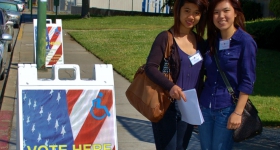Photo by Damien Maloney
Stephanie Kang entered college with visions of corporate law success. Her freshman dreams, born in the hallways of USC’s Marshall School of Business, were dappled with shiny corner offices, six-figure salaries and mindless minions to carry out her bidding.
That all changed after she participated in one of USC’s student advocacy seminars.
“I've always been social justice-oriented,” she recalls. “In fifth grade, I wrote an essay on the discrimination my Grandma had faced as a monolingual immigrant in the US and it won second place!”
The kernel of consciousness bloomed into full-fledged commitment during her sophomore year of college, when she participated in a USC Asian Pacific American Student Services program called CIRCLE (Critical Issues in Race, Class & Leadership Education) that discussed issues affecting APA and minority communities. Through the program, she visited several community-based organizations, learned about all the work they did and met clients.
What Kang saw struck a chord: “It made me realize that being an advocate and providing direct services is what I really feel passionate about.” She never looked back.
Since graduating from USC in 2007, Kang has worked in domestic violence intervention and prevention and in legal outreach. In 2009, after two years as a youth specialist and program coordinator at the Asian Pacific Family Center in Rosemead, CA, she enrolled at UC Hastings College of The Law. Having just finished her second year, she has amassed accolades such as the national title for the Asylum & Refugee Moot Court Competition, the Justice Stephen K. Tamura Scholarship, and the Robert E. Wone Fellowship, just to name a few. Her past summer clerkship landed her at API Legal Outreach in San Francisco, where she worked on cases relating to domestic violence, restraining orders, and human trafficking.
Her current project, taking place at Hastings, is awarding honorary degrees to Japanese Americans whose legal education was interrupted as a result of World War II internment. In the 1940s, even more so than today, higher education -- especially graduate school -- was inaccessible for most immigrant communities, she explains. “I was amazed that 10 students of Japanese descent were even enrolled in Hastings at the time! These students had their education interrupted by Executive Order 9066 [the 1942 presidential order that banished Japanese Americans to internment camps] and their entire lives turned upside down when they were forced into internment.”
Following the end of World War II, many students came back to Hastings or went to another law school to finish their legal education. Kang was touched by that resilience and determination in the face of severe injustice and wanted to honor that perseverance. “The individuals who never had the opportunity to finish their legal education or pursue a career in law deserve to be recognized,” she says. “I think it's really important for us to remember that the older generations fought for our rights and opened the doors for us. The internment of people of Japanese descent can't be swept under the rug and forgotten.”
Kang was born and raised as a proud Chinese Taiwanese American in the Bay Area. Her father enjoys waxing eloquent about the Kang family heritage in the mountains of the Shantong Province, and Kang is very much in touch with her Taiwanese background as well. Her knowledge of local Taiwanese cuisine is encyclopedic, and if you squint hard enough, you can make out the Hello Kitty bow imprinted on her otherwise professional-looking bag.
But, behind the Sanrio-sweet smile, Kang never forgets what drives her.
“Exec Order 9066 was a facially discriminatory act, and Korematsu v. United States [a Supreme Court case upholding the constitutionality of Exec Order 9066] is still good law today. That's why it's so important for us to recognize the sacrifices that others were forced to make and commend their strength in the face of discrimination and hardship.”
Diana Lin is a staff writer for Hyphen.









Comments